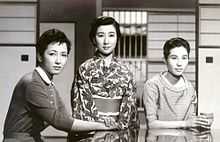Equinox Flower
| Equinox Flower Higanbana | |
|---|---|
 Studio still showing from left: Ineko Arima, Fujiko Yamamoto & Yoshiko Kuga | |
| Directed by | Yasujiro Ozu |
| Produced by | Shizuo Yamanouchi |
| Written by | Kōgo Noda, Yasujirō Ozu |
| Based on | novel by Ton Satomi |
| Starring | Shin Saburi, Kinuyo Tanaka, Ineko Arima, Yoshiko Kuga |
| Music by | Takanobu Saitō |
| Cinematography | Yuharu Atsuta |
| Edited by | Yoshiyasu Hamamura |
| Distributed by | Shochiku |
Release dates | 1958 |
Running time | 118 minutes |
| Country | Japan |
| Language | Japanese |
Equinox Flower (彼岸花 Higanbana) is a 1958 color Japanese film directed by Yasujirō Ozu. The film is based on a novel by Ton Satomi. The film won the 1958 Blue Ribbon Award for Fujiko Yamamoto's performance as Best Actress.
Plot
Wataru Hirayama (Shin Saburi) is a wealthy Tokyo businessman who acts as a go-between for couples seeking marriages. When an old schoolmate Mikami (Chishū Ryū) approaches him for help concerning his daughter Fumiko (Yoshiko Kuga), who has run off owing to a conflict with her father, he agrees. Finding her in a bar where she now works, he listens to her side of the story. Fumiko complains that her father is stubborn, insisting on arranging her marriage, whereas she has now fallen in love with a musician and is adamant to lead life her own way.
One day during work, a young man named Masahiko Taniguchi (Keiji Sada) approaches Hirayama to ask for the hand of his elder daughter, Setsuko (Ineko Arima). Hirayama is extremely unhappy that his daughter has made wedding plans on her own. He confronts her at home, during which he blows his top, and rules that she must remain locked at home until she sees the folly of her ways. Hirayama tries to find out more about Taniguchi from his subordinate.
Owing to the standoff, his daughter's friend Yukiko (Fujiko Yamamoto) tries a ruse in which she asks Hirayama opinion concerning a similar situation – her mother forcing her to marry someone she didn't like. When Hirayama advises her to ignore her mother, Yukiko reveals it is all a setup and states that Hirayama has just given his consent to Setsuko's marriage.
Hirayama's wife Kiyoko (Kinuyo Tanaka) tries unsuccessfully to make him change his mind. She accuses her husband of being "inconsistent". Even his younger daughter Hisako (Miyuki Kuwano) is on the side of her sister, finding her father too old-fashioned. Finally, after the couple's insistence on getting married, Hirayama decides to give in by attending his daughter's wedding.
After the wedding, Mikami reveals that he, like Hirayama, has agreed to let his daughter select her own marriage partner. After going for a short business trip outside Tokyo, Hirayama decides to visit the newly-weds at Hiroshima by train, where Taniguchi is stationed by his company.
Production
It is Yasujirō Ozu's first film in color while Japan's first color film, Keisuke Kinoshita's Carmen Comes Home, had been released in 1951. Ozu chose Agfa film from Germany over Kodak or Fujifilm, as he felt that it conveyed red colors better. The meaning of "equinox flower" or "higanbana" of the title is the red Lycoris.
Cast
- Shin Saburi - Wataru Hirayama
- Kinuyo Tanaka - Kiyoko Hirayama
- Ineko Arima - Setsuko Hirayama
- Miyuki Kuwano - Hisako Hirayama
- Yoshiko Kuga - Fumiko Mikami
- Chishū Ryū ... Shukichi Mikami
- Fujiko Yamamoto - Yukiko Sasaki
- Keiji Sada - Masahiko Taniguchi
- Teiji Takahashi - Shotaru Kondo
- Fumio Watanabe - Ichiro Nagamura
- Nobuo Nakamura - Toshihiko Kawai
- Ryūji Kita - Heinosuke Horie
Release
Home media
In 2011, the BFI released a Region 2 Dual Format Edition (Blu-ray + DVD).[1] Included with this release is a standard definition presentation of There Was a Father.
References
External links
- Rotten Tomatoes Reviews
- Higanbana at the Internet Movie Database
- Higanbana at AllMovie
- 1970 version of Japanese film poster
- Equinox Flower at Ozu-san.com
| ||||||||||